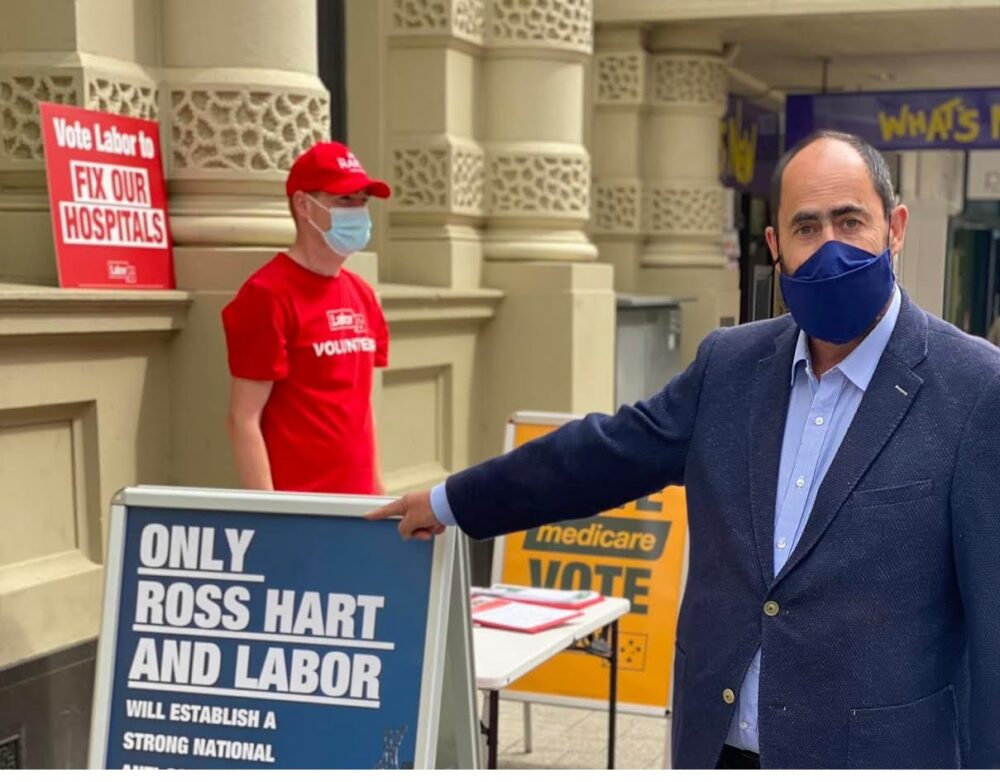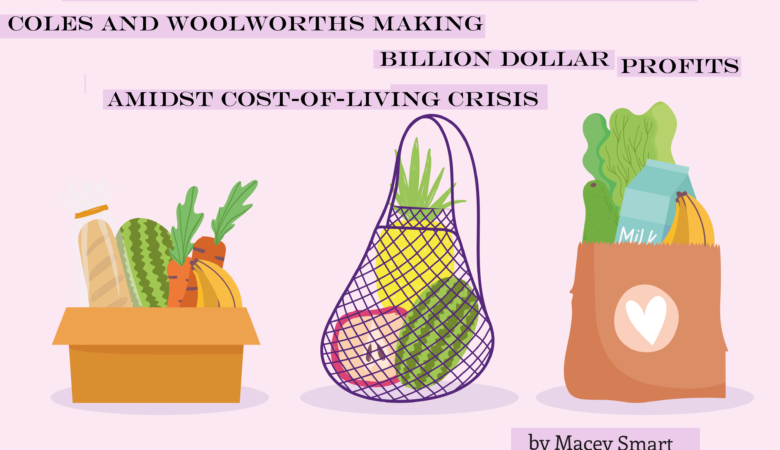Labor Left’s Ross Hart narrowly missed out out on re-election in 2019. Running again in the marginal seat of Bass later this year, the Launceston based legal practitioner sits down with Tog co-editor Desmond Marcenko to discuss ALP policy.
What went wrong in your 2019 campaign?
I missed out by somewhat under 600 votes, so I don’t see that as a rejection of me as a candidate. I think that the review that was undertaken nationally by the Labor Party demonstrates there were a number of issues that were national issues that impacted on the campaign. The fact that I missed out by less than 600 votes, whilst it was regrettable, I think that I can hold my head up high and say that I’d done everything I could when I was facing the electorate. There are issues for example, like the franking credits that impacted. Also, Clive Palmer’s advertising to disadvantaged Tasmanians played a part.
I’m getting a completely different message at the moment, particularly around the incompetence of Scott Morrison, which I think will make a difference. Bass is a marginal seat, you know, I trust the wisdom of the electorate. I missed out by less than 600 votes, I don’t see it as a personal rejection.
How can the ALP entrench themselves in Northern Tasmania’s marginal electorates?
I would love to see the ALP entrenched, but you’ve had a long history of this electorate being favoured in elections. Marginal seats typically are the beneficiaries of substantial promises made by both sides of politics. That concerns me because the expectation is that you’re able to deliver significant projects. My preference would be to see the delivery of, for example, manufacturing jobs in North Tasmania. Raising the standard of education whether it’s skilled education through technical and further education or university education, because we know the linkage between education and life outcomes, whether they’re your health outcomes or otherwise. Your income is significantly better at the higher education that you have.
So Northern Tasmania has pockets of disadvantage that are amongst some of the worst in Australia. I would like to see investment in our healthcare system and investment in housing, particularly in social and affordable housing. So my focus is upon attempting to deliver those sorts of things, rather than shiny projects. Now, there will be shiny projects, but if those projects are delivered by a Albanese government , there will be a focus on outcomes with respect to jobs and net benefits to the community, as well investments in health and education.
The ALP’s internal review concerning their 2019 election loss blamed in part a ‘cluttered policy agenda that looked risky’. If shying away from bold policy was the lesson the ALP took from 2019, how can you possibly hope to excite voters to support your party in May?
There’s a very, very short answer to that. The number one issue that I’ve found that has engaged with voters here when I’ve been talking to them, is the prospect of reintroduction of manufacturing jobs into particularly the northern suburbs here in Launceston. The onset of the pandemic demonstrated […] that we were importing a whole range of manufactured goods, including for example, N-95 masks. So you know, there are issues addressing our sovereign capability which are addressed by investing in manufacturing jobs. Now, Northern Tasmania has had a long history of manufacturing whether it’s in textiles, the automotive industry, some advanced manufacturing particularly with respect to electronics and the like. A lot of investment around the Australian Maritime College.
Now I would like to see investment in skills training, manufacturing jobs, you know giving some love to, in particular the lower middle class – ‘working class’ you would have described them in the past, who have increasingly been marginalised. Now the language that most people talk about is that these people don’t need a hand out, well they don’t need a hand out, they want a job. They want a secure job. So if you’re working in casual employment or if you’re working as a contractor, you may not know how many shifts you’ve got next week. Now that may be fine if you’re working at university, you’re studying – working at Coles like my son does at present despite the fact that he’s got a Masters in Architecture, it’s fine. But in order to sustain communities, particularly communities that have increasingly been impoverished, you need to focus upon secure jobs in areas where we can compete with low wage cost economies – like China, Thailand, elsewhere. That means that we need to be very smart about investing in manufacturing areas where we have an advantage.
In an interview in January, ALP leader Anthony Albanese championed economic growth and productivity as a means to lift up those who have been left behind by nine years of LNP government. In light of this and the party dropping the negative gearing and franking credits policies it took to the last election, has the ALP forsaken the redistributive politics upon which it built its name?
No. In fact, you can still have policies which invest in secure jobs, you can still have policies which invest in wages growth. For example, the last 15-20 years have seen the erosion of union membership and the erosion of the value of the basic wage. The Reserve Bank has even called out low wage growth as one of the greatest risks to the Australian economy. So we support wage growth. I think that is the greatest thing that we can do to assist in ensuring, you know, the ledger is weighed down in support of people with low wages. Government should be an active participant in that process rather than […] being a bystander. So, you do more than simply saying, ‘oh look let’s just tax the rich’, my answer to that is that we already do tax the rich, but let’s make sure they actually pay. Because at the moment, this government has a woeful record on making sure that international corporations actually pay their fair share of tax. Now that’s not becoming what the government criticises as being a socialist government, that’s actually making sure that those who are responsible for generating significant amounts of economic activity, actually pay their fair share of tax.
How can the ALP position themselves as a legitimate alternative to the LNP on climate change policy, yet pledge public money for natural gas refineries and support thermal coal mining continuing past 2050?
Well, I’ll deal with thermal coal for a start. I’m informed by best practice. For example, in Germany and elsewhere, where the concept of a just transition applies, the union movement and the government in Germany focused upon what was necessary to transition the workforce to a low carbon future. The problem we’re facing in Australia is that we have existing coal mines that will be operating for a period of time in the future, so applying those principles of just transition you have to support those mines until such a time as you’re in a position to address the requirement for thermal coal or coal that is used for other purposes. That doesn’t amount to putting your head in the sand with respect to the dangers presented by climate change, but my prediction is that we’ll see rapid changes in technology and market forces leading to that transition sooner rather than later. But I emphasise that Labor’s approach is best represented by the fact that we’re not prepared to have the markets in Wall Street or elsewhere, decide that there’s no market for coal or there’s no market for gas and thereby workers lose their jobs with no forward planning. We have a concrete plan for the future, which essentially means you can’t be investing in new coal mines, you need to actually be supporting the structured phase out of existing coal mines, but you can’t close them tomorrow. There will be a demand there which will be reducing over time, but I’m very hopeful that those very same market forces will be addressed in a strategic plan that will see a just transition to those workers into new jobs in the new economy.
The difference between the two sides is this: there are persistent climate change denialists in the Liberal government. They deny this issue exists at all. We have a senator who dresses up in high vis and puts coal dust on his face to demonstrate his commitment to coal mining jobs. My message to those people who work in coal exposed industries is that you need to recognise that coal will be phased out and that you need to make a transition towards those jobs going elsewhere. If you don’t plan for that transition then they’re going to lose their jobs because nobody is going to buy the product. That would be catastrophic for a wide range of communities. So having a measured response which recognises the need to support these communities, supports the introduction of new renewable energies, […] is vitally important.
I guess I can understand wanting to support existing industries and communities, but why would the Labor Party pledge public money to funding a new fossil fuel industry in the form of the Beetaloo Basin natural gas extracting?
My understanding is that at least with respect to that project, that LNG is seen as a transitional fuel. Personally, being a Tasmanian and being completely comfortable with the pervasive nature of renewable energy within the Tasmanian economy, I have an absolute commitment to renewable energy in its many forms, whether it’s wave, whether it’s tidal, whether it’s wind, whether it’s using hydro for energy storage as well as generation. But my understanding is that these are seen as transitional fuels. I wasn’t a member of the parliament when this was approved, I haven’t had the benefit of all the conversations that occurred within caucus with respect to the approval, but that doesn’t diminish our commitment to addressing climate change, and our commitment is to see us transition to a low carbon future. Gas is seen as a transitional fuel.
We did however criticise the coronavirus recovery taskforce, which led with gas as being the only solution. Clearly a manufacturing future within Australia is more reliant towards green hydrogen then LNG.
On a related note, in light of ongoing seismic testing by American company ConcoPhillips, would you go on record to oppose future oil and gas drilling in in the Bass Strait?
Well, my understanding is that there’s been Senate inquiries into that and that it’s an issue of concern. It’s particularly of concern to Tasmanians because some of that exploration and seismic testing has occurred in fishing grounds adjacent to Tasmania. And again, whilst I haven’t been a member in the last parliament, in the period between 2016 and 2019, there were concerns expressed at that time and public statements were made by Labor members at that stage expressing real concerns about that.
Would an ALP government fast-track the release of the 70 detainees from the Park Hotel back into the community? Would you agree that indefinite detention is torture?
I absolutely agree that indefinite detention is unacceptable. I do not agree with that. There seems to me to be a mismatch between using indefinite detention as a deterrent and ‘saying look you should not come to Australia because you’ll be placed in detention’, and keeping people beyond a reasonable time to ensure they are resettled. Our commitments have been with respect to our desire to ensure that people are resettled, while ensuring that people don’t make that dangerous trip to Australia. The difference between the two sides of politics is that this government is content to have them sitting in the Park Hotel and take no action. The reason why I say that is the fact that the minister can with the stroke of a pen, release each and everyone of those people immediately. The fact that they do not do that demonstrates the fact that they are prepared to perpetuate that cruelty.
How would you assess the performance of the Morrison government?
I think I’ve run out of superlatives to describe how badly they’ve performed on every measure. Whether it’s at the basic level of a vision for the future of the country or at the level of competence – whether they’re actually able to fulfil their stated aims. There’s a lot said about the fact that the prime minister in particular is very good at making announcements, but not very good at actually delivering. So whether you’re a female raising allegations of misogyny or violence in parliament, or whether you’re complaining about matters such as the religious discrimination bill, it seems to me this government is completely incompetent when it comes to listening to the concerns of the great majority of people and where appropriate addressing those real concerns.
If you look at, for example, those issues raised 12 months ago, you know, allegations of sexual discrimination and violence against women, we saw not only a tone-deaf response, but what response was delayed and appeared to be misdirected. And even then, if you judge their response as to what’s actually been delivered, it took until late last year for there to be the report by Kate Jenkins. The government has said that it will accept and implement those reports. Now if we had, from my perspective, a disaster and the Morrison Government was re-elected, there wouldn’t be many people that’d have a great deal of confidence as to whether they would in fact deliver the balance of those recommendations.
Turning on to another issue which is implicit with respect to competence, look at the spectre of a national commission dealing with anticorruption. The government promised over three years ago it was going to introduce legislation to deal with this. Labor was not happy with their model, ‘cause the model we said was ineffective. The crossbenchers criticised the model that was put forward by the Liberal government and proposed an alternative. Whether it’s the Labor proposal or the crossbench proposal put forward by the member for Indi, Helene Haines, one of the key issues with respect to a robust commission dealing with anticorruption is the fact that it’s able to investigate past misconduct. I’ve been knocking on doors up until Christmas and obviously 15th of December meant there was a change in the landscape, so you know, contact has been limited since then, but a lot of people are very angry about the fact that we were promised something to deal with corruption within the political process, but despite promises the government has not delivered any legislation. It’s quite clear from where I sit, that is in the marginal electorate of Bass, that, not withstanding that Bridget Archer supported the introduction of an anticorruption commission, the only way that the voters of Bass and voters elsewhere are going to get a national commission dealing with anticorruption, is to vote and install a Labor government.
You know, those two issues are emblematic that the government lacks vision and even where it has put forward a vision, it seems to lack the confidence to deliver anything.
We’ve seen sports rorts, pork-barrelling and dodgy deals from this government. With the ALP proposing a federal ICAC, do you frame this election as corruption vs. anti-corruption?
Yes. If your vote’s going to depend on who introduces an independent commission against anticorruption, then a vote for Labor is a vote for that. People are really concerned about standards within politics and I think rightfully so. The fact is that this government already has a slush fund of billions of dollars that are already reflected in the budget as decisions being taken but yet to be announced, so it will be campaigning as a Liberal government handing out money seeking re-election. That’s unacceptable. There’s a difference between doing that and making a promise that is conditional upon you being elected.








